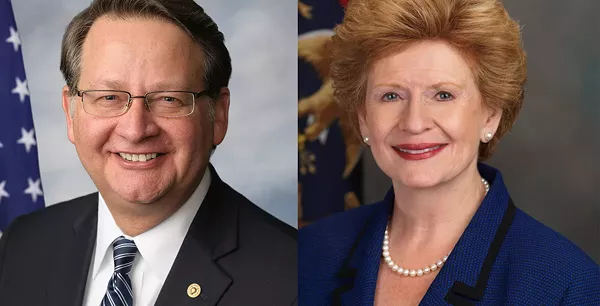
Audio By Carbonatix
[
{
"name": "GPT - Leaderboard - Inline - Content",
"component": "35519556",
"insertPoint": "5th",
"startingPoint": "3",
"requiredCountToDisplay": "3",
"maxInsertions": 100,
"adList": [
{
"adPreset": "LeaderboardInline"
}
]
}
]

A day after passing the House, a bill to roll back regulations on all but the nation's largest banks is heading to President Donald Trump's desk, where he says he will sign it.
Big legislation will be signed by me shortly. After many years, RIGHT TO TRY and big changes to DODD FRANK.
— Donald J. Trump (@realDonaldTrump) May 23, 2018
The measure represents the most significant loosening of restrictions on banks since the Great Recession. The broad package increases the threshold at which banks face stricter oversight, from $50 billion in assets to $250 billion in assets, allowing two dozen big-but-not-behemoth banks (think Suntrust and Fifth-Third) to make more risky moves. Other provisions include a loosening of regulations on credit unions and community banks who argue they were unduly burdened by some elements of Dodd-Frank. Most of these banks have less than $1 billion in assets.
The downsides are that if a few mid-sized banks with more than $200 billion in assets fail, that equals a behemoth bank. Mid-sized banks can also impact the economy on their own. As was noted in a March report by The Hill, mortgage lender Countrywide Financial had $200 billion in assets when it became one of the key players in the financial crisis.
A Congressional Budget Office scoring of the bill found it would slightly increase the possibility of bank failures and would likely mean more public funding for bank bailouts. The CBO projected those bailouts would cost taxpayers an estimated $671 million over a 10-year period.
There's also concern the bill will allow banks to engage in discriminatory lending practices — as it exempts nearly all banks from new data-reporting requirements that help expose such issues.
Sounds like a compromise right? It certainly did to Democrat Michigan Sen. Gary Peters, who co-sponsored the legislation. Democrat Sen. Debbie Stabenow got on board too, as did 15 other Democrat senators. Many of them, like Stabenow, are facing re-election battles in states won by Trump.
“Our member-owned credit unions and community banks—who did not cause the crisis—are vital to small businesses and families," Stabenow said in a statement in March. "Unfortunately, they are starting to disappear from cities and small towns across Michigan and are facing unnecessary regulations."
Said Peters, "Michigan credit unions and community banks stepped up and helped keep Michigan families afloat during the financial crisis by offering credit when big banks wouldn’t."
The bill had limited Democratic support in the House as well. Yesterday's 258-159 vote included "yeas" from 33 Democrats — though notably, every House Democrat from Michigan voted against it.
Also opposed was House Minority Leader Nancy Pelosi, who said on Twitter that the bill "would open the doors to banks once again discriminating in how they lend to home buyers." In the Senate, actually left Democrats like Bernie Sanders of Vermont and Elizabeth Warren of Massachusetts blasted the bill.The #DoddFrankRollBack would open the doors to banks once again discriminating in how they lend to home buyers. We should be taking steps to move forward, not making the situation worse.
— Nancy Pelosi (@NancyPelosi) May 22, 2018
"We’ve been down this road before," Sen. Warren said on Twitter in March. "Whenever things are going OK in the financial system, the lobbyists flood the halls of Congress & convince politicians to roll back the rules – because what could possibly go wrong?"
Representatives from banks also flood campaign coffers with cash in times like these. Stabenow, in particular, saw a spike in campaign contributions from commercial banks this election cycle. As of March, she had accepted at least $83,000 in contributions from commercial banks, the fifth-highest amount accepted by a Democrat and the seventh-highest in the Senate overall, according to the Center for Responsive Politics. She has received at least $485,000 from the securities and investments industry over the past five years.
Peters has in the past five years accepted approximately $650,000 in contributions from the securities and investment industry and nearly $175,000 from the commercial banking sector.
Stabenow's office didn't say whether the campaign contributions influenced her vote. A spokesman for Peters said the senator’s "policy positions are driven by what’s best for Michigan’s middle-class, working families – not by campaign contributions."
So many restaurants, so little time. Find out the latest Detroit dining news with our weekly food newsletter delivered every Friday morning.





